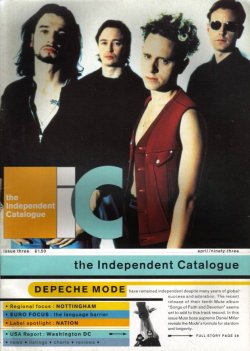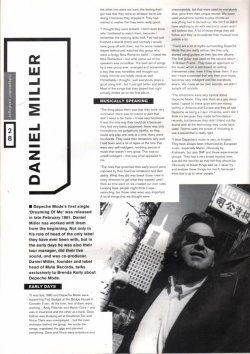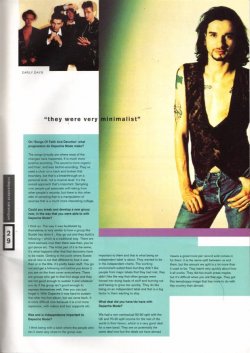Daniel Miller (Interview)
[Independent Catalogue, April 1993. Words: Brenda Kelly. Pictures: Uncredited.]



Depeche Mode’s first single “Dreaming Of Me” was released in late February 1981. Daniel Miller has worked with them from the beginning. Not only in his role of head of the only label they have ever been with, but in their early days he was also their tour manager, did their live sound, and was co-producer. Daniel Miller, founder and label head of Mute Records, talks exclusively to Brenda Kelly about Depeche Mode.
Early Days
“It was late 1980 and Depeche Mode were supporting Fad Gadget at the Bridge House in Camden Town. At the time, two of them were working – Andy Fletcher and Martin Gore – one was in insurance and the other at a bank. Dave Gahan was studying art at Southend Tec and Vince Clarke was unemployed – but the main motivator behind the group. He wrote the songs, organised the gigs and planned everything. Dave and Vince were ambitious and the other two were not sure, the feeling that I got was that they were an amateur band just doing it because they enjoyed it. They had started to realise that they were really good.
“I thought they were brilliant. I don’t even know why I bothered to watch them, because I remember the evening quite well. Fad had just finished a sound check and normally I would have gone off with them, but for some reason I stayed behind and watched this group who were a dodgy New Romantic band – I hated the New Romantics – but what came out of the speakers was incredible. The best set of songs by a new group ever, arranged and presented in a way that was incredibly well thought out, totally minimal and totally naïve as well. Immediately I thought, “well, everybody plays a good song first”, but it just got better and better. Most of the songs that they played that night actually ended up on the first album.
Musically Speaking
“The thing about them was that they were very minimalist, there was no sound or part that didn’t need to be there – it was very functional. It was the only way they could do it because they had very basic equipment: there was only monophonic not polyphonic synths, so they could only play one note at a time, there were no chords. They used their limitations very well. I had been sent a lot of tapes at the time that were very self-indulgent, rambling pieces of music that weren’t very good. This was so unself-indulgent – that was what appealed to me.
“The rules that governed their early sound were imposed by their financial limitations and their ability. What they did was break those rules in every direction to get what they wanted, and I think as time went on we created our own rules. Looking back people might think it was restricting, but those rules were very important. A lot of things that we thought were unacceptable, but that were used by everybody else, gave them their unique sound. We never used polyphonic synths to play chords so everything had to be built up. We felt that didn’t have anything to do with electronic music and I still believe that. A lot of those things they still follow and they’ve broadened their musical tonal palette a lot.
“There are a lot of myths surrounding Depeche Mode that are really untrue, like they only started using guitars on their last two albums. The first guitar was used on the second album – “A Broken Frame”. They have an approach to the music which is still based on setting themselves rules, even if they break them. If you don’t have a concept that way then your music becomes very indulgent and like everybody else’s. We made all our own sounds, we didn’t sample off records.
“The Americans were very cynical about Depeche Mode. They saw them as a gay disco band. [1] I speak to these guys who are mixing techno in America and Europe and they all cite Depeche as being a major influence, and I don’t think it’s because they made techno-dance records, but because they didn’t bland out the sound with all the technology they could have used. Techno uses the power of choosing to use a sound that is really right.
“I think Depeche’s music is very un-English. They have always been influenced by European music, especially Martin, obviously by Kraftwerk, but also DAF and those experimental groups. They had a very broad musical view, and did the records as they felt they should be. Obviously all these things add up. I never try and analyse these things too much, because I think that’s up to other people.”
On “Songs Of Faith And Devotion” what progression do Depeche Mode make?
The songs lyrically are where most of the changes have happened. It is much more positive sounding. The sound is more organic and freer, and less techno-sounding. They’ve used a choir on a track and broken that boundary, but that’s a breakthrough on a personal level, not a musical level: it’s the overall approach that’s important. Sampling now people just associate with taking from other people’s records, but there is this other side of sampling that is a manipulation of sources that is a much more interesting collage.
Could you break and develop a new group now, in the way that you were able to with Depeche Mode?
I think so. The way it was facilitated by themselves is very similar to how a group like Suede has done it, they go out and they build a following – which is a traditional way. There are more avenues now than there was then, you’ve got dance etc. The initial part of it is the same, it’s what happens after that that decisions have to be made. Getting to the point where Suede are at now is not that difficult to how it was then or in the 60s, it’s pretty basic stuff. You go out and get a following and before you know it you are on the front cover everywhere. There are groups who get to that first stage and they are not good enough to sustain it and whatever you do if the group isn’t good enough to express themselves well, then you can just forget it. With Depeche it was hard to sustain that after the first album, but we came back. It is more difficult now because it is a lot more expensive, with videos and tour supports etc.
Was and is independence important to Depeche Mode?
I think being with a label where the people who ran it were very close to the group was important to them and that is what being an independent label is about. They wanted to be in the independent charts. The working environment suited them but they didn’t like people from major labels that they had met, they didn’t like the way that other groups were forced into doing loads of stuff and burning out and having to grow too quickly. They do like being on an independent label and that is a big factor in them wanting to stay.
What deal did you have / do have with Depeche Mode?
We had a non contractual 50-50 split with the UK and 70-30 split income for the rest of the world in their favour, which is a very good deal for a new band. They are on potentially the same deal now but the deals we have abroad means a great more [sic] per record sold comes in for them. It is the same split between us and them, but the amount we split is a lot more than it used to be. They learnt very quickly about how it all works. They did too much press maybe, but it’s difficult when you are that age. They got this teenyboppy image that has more to do with this country than abroad.
[Independent Catalogue, April 1993. Words: Brenda Kelly. Pictures: Uncredited.]
Depeche Mode's doting father looks back on his discovery of the band and their approach to developing their sound, their studio "rules" and how an independent label helped them flourish. Next to a terribly emaciated shot of Dave, it does all sound a bit like the parent late at night at the police station sighing, "Whatever he does, he's still my little boy...". Still, an unusual reverse-angle view of the band through the eyes of someone who knows them best.
" Dave and Vince were ambitious and the other two were not sure, the feeling that I got was that they were an amateur band just doing it because they enjoyed it. They had started to realise that they were really good. "



Depeche Mode’s first single “Dreaming Of Me” was released in late February 1981. Daniel Miller has worked with them from the beginning. Not only in his role of head of the only label they have ever been with, but in their early days he was also their tour manager, did their live sound, and was co-producer. Daniel Miller, founder and label head of Mute Records, talks exclusively to Brenda Kelly about Depeche Mode.
Early Days
“It was late 1980 and Depeche Mode were supporting Fad Gadget at the Bridge House in Camden Town. At the time, two of them were working – Andy Fletcher and Martin Gore – one was in insurance and the other at a bank. Dave Gahan was studying art at Southend Tec and Vince Clarke was unemployed – but the main motivator behind the group. He wrote the songs, organised the gigs and planned everything. Dave and Vince were ambitious and the other two were not sure, the feeling that I got was that they were an amateur band just doing it because they enjoyed it. They had started to realise that they were really good.
“I thought they were brilliant. I don’t even know why I bothered to watch them, because I remember the evening quite well. Fad had just finished a sound check and normally I would have gone off with them, but for some reason I stayed behind and watched this group who were a dodgy New Romantic band – I hated the New Romantics – but what came out of the speakers was incredible. The best set of songs by a new group ever, arranged and presented in a way that was incredibly well thought out, totally minimal and totally naïve as well. Immediately I thought, “well, everybody plays a good song first”, but it just got better and better. Most of the songs that they played that night actually ended up on the first album.
Musically Speaking
“The thing about them was that they were very minimalist, there was no sound or part that didn’t need to be there – it was very functional. It was the only way they could do it because they had very basic equipment: there was only monophonic not polyphonic synths, so they could only play one note at a time, there were no chords. They used their limitations very well. I had been sent a lot of tapes at the time that were very self-indulgent, rambling pieces of music that weren’t very good. This was so unself-indulgent – that was what appealed to me.
“The rules that governed their early sound were imposed by their financial limitations and their ability. What they did was break those rules in every direction to get what they wanted, and I think as time went on we created our own rules. Looking back people might think it was restricting, but those rules were very important. A lot of things that we thought were unacceptable, but that were used by everybody else, gave them their unique sound. We never used polyphonic synths to play chords so everything had to be built up. We felt that didn’t have anything to do with electronic music and I still believe that. A lot of those things they still follow and they’ve broadened their musical tonal palette a lot.
“There are a lot of myths surrounding Depeche Mode that are really untrue, like they only started using guitars on their last two albums. The first guitar was used on the second album – “A Broken Frame”. They have an approach to the music which is still based on setting themselves rules, even if they break them. If you don’t have a concept that way then your music becomes very indulgent and like everybody else’s. We made all our own sounds, we didn’t sample off records.
“The Americans were very cynical about Depeche Mode. They saw them as a gay disco band. [1] I speak to these guys who are mixing techno in America and Europe and they all cite Depeche as being a major influence, and I don’t think it’s because they made techno-dance records, but because they didn’t bland out the sound with all the technology they could have used. Techno uses the power of choosing to use a sound that is really right.
“I think Depeche’s music is very un-English. They have always been influenced by European music, especially Martin, obviously by Kraftwerk, but also DAF and those experimental groups. They had a very broad musical view, and did the records as they felt they should be. Obviously all these things add up. I never try and analyse these things too much, because I think that’s up to other people.”
On “Songs Of Faith And Devotion” what progression do Depeche Mode make?
The songs lyrically are where most of the changes have happened. It is much more positive sounding. The sound is more organic and freer, and less techno-sounding. They’ve used a choir on a track and broken that boundary, but that’s a breakthrough on a personal level, not a musical level: it’s the overall approach that’s important. Sampling now people just associate with taking from other people’s records, but there is this other side of sampling that is a manipulation of sources that is a much more interesting collage.
Could you break and develop a new group now, in the way that you were able to with Depeche Mode?
I think so. The way it was facilitated by themselves is very similar to how a group like Suede has done it, they go out and they build a following – which is a traditional way. There are more avenues now than there was then, you’ve got dance etc. The initial part of it is the same, it’s what happens after that that decisions have to be made. Getting to the point where Suede are at now is not that difficult to how it was then or in the 60s, it’s pretty basic stuff. You go out and get a following and before you know it you are on the front cover everywhere. There are groups who get to that first stage and they are not good enough to sustain it and whatever you do if the group isn’t good enough to express themselves well, then you can just forget it. With Depeche it was hard to sustain that after the first album, but we came back. It is more difficult now because it is a lot more expensive, with videos and tour supports etc.
Was and is independence important to Depeche Mode?
I think being with a label where the people who ran it were very close to the group was important to them and that is what being an independent label is about. They wanted to be in the independent charts. The working environment suited them but they didn’t like people from major labels that they had met, they didn’t like the way that other groups were forced into doing loads of stuff and burning out and having to grow too quickly. They do like being on an independent label and that is a big factor in them wanting to stay.
What deal did you have / do have with Depeche Mode?
We had a non contractual 50-50 split with the UK and 70-30 split income for the rest of the world in their favour, which is a very good deal for a new band. They are on potentially the same deal now but the deals we have abroad means a great more [sic] per record sold comes in for them. It is the same split between us and them, but the amount we split is a lot more than it used to be. They learnt very quickly about how it all works. They did too much press maybe, but it’s difficult when you are that age. They got this teenyboppy image that has more to do with this country than abroad.
[1] - Try the beginning of this article where, as late as 1990, they were still having to endure this image in the USA.
As for the surprising "disco" tag, let's remember that trends such as Futurism and the New Romantics, and consequently many of the styles that came from them, were comparatively unheard of in America.
